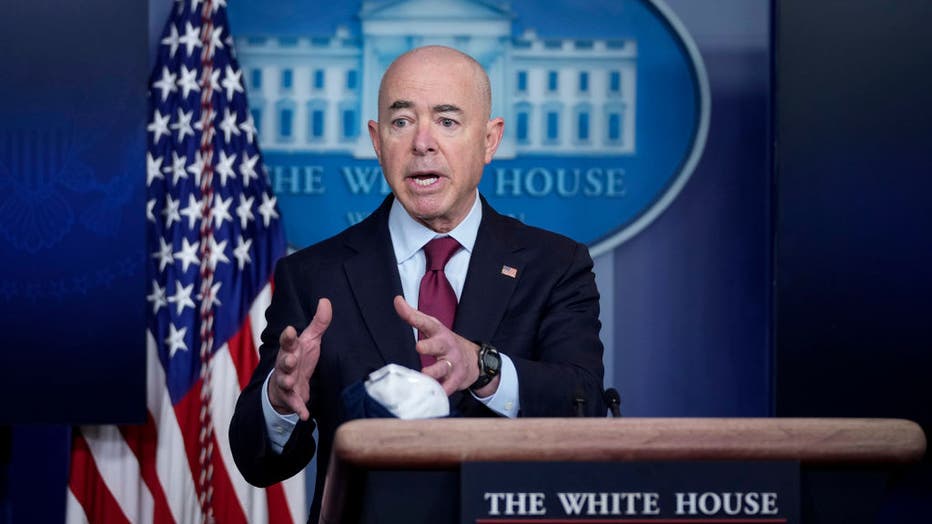US begins reuniting families at Mexican border in ‘beginning’ of broader effort
DHS Chief Mayorkas says President Biden not responsible for border surge
Homeland Security Secretary Alejandro Mayorkas told Chris Wallace on ‘FOX News Sunday’ that the ongoing migrant surge at the US-Mexico border is a ‘result of President Trump’s dismantlement of safe and orderly immigration processes.’ Video courtesy: FOX News Sunday
WASHINGTON - The Department of Homeland Security on Monday announced that four families who were separated at the U.S.-Mexico border during the Trump administration will be reunited this week in the U.S.
Homeland Security Secretary Alejandro Mayorkas called the reunions "just the beginning" of a broader effort.
President Joe Biden said that is why he established the Family Reunification Task Force in the first few weeks of his presidency.
"Families belong together," he tweeted Monday. "We’re working tirelessly to bring families together — and this week we will begin to reunite the first of those families."
"The Family Reunification Task Force has been working day and night to address the prior administration’s cruel separation of children from their parents," Mayorkas tweeted on Monday. 'I’m proud to announce we will begin to reunite the first of those families."
Two of the four families include mothers who were separated from their children in late 2017, one Honduran and another Mexican, Mayorkas said, according to the Associated Press. He declined to detail their identities, but described them as children who were 3 years old at the time and "teenagers who have had to live without their parent during their most formative years"
"The Family Reunification Task Force has been working day and night, across the federal government and with counsel for the families and our foreign partners, to address the prior administration’s cruel separation of children from their parents," Mayorkas said in a statement. "Today is just the beginning. We are reuniting the first group of families, many more will follow, and we recognize the importance of providing these families with the stability and resources they need to heal."

FILE - Secretary of Homeland Security Alejandro Mayorkas speaks during the daily press briefing at the White House on March 1, 2021 in Washington, D.C. (Photo by Drew Angerer/Getty Images)
Parents will return to the U.S. on humanitarian parole while authorities consider other longer-term forms of legal status, Michelle Brane, executive director of the administration's Family Reunification Task Force, told the AP. The children are already in the U.S.
Exactly how many families will reunite in the United States and in what order is linked to negotiations with the American Civil Liberties Union to settle a federal lawsuit in San Diego, but Mayorkas said there were more to come.
"We continue to work tirelessly to reunite many more children with their parents in the weeks and months ahead," Mayorkas told reporters ahead of the announcement. "We have a lot of work still to do, but I am proud of the progress we have made and the reunifications that we have helped to achieve this week."
More than 5,000 children were separated from their parents during the Trump administration beginning in July of 2017, many of them under a "zero-tolerance" policy to criminally prosecute any adult who entered the country illegally, according to court filings.
The Biden administration is doing its own count going back to Trump's inauguration in January 2017 and, according to Brane, believes more than 1,000 families remain separated.
While family separation under "zero-tolerance" ended in June 2018 under court order and shortly after Trump reversed course, Biden has repeatedly criticized the policy as an act of cruelty. On his first day in office, Biden signed an executive order that pledged to reunite families that were still separated "to the greatest extent possible."
RELATED: Biden signs immigration orders aimed at undoing Trump-era policies, reuniting families
The reunification effort begins as the Biden administration has faced an influx of migrants arriving at the border, including an increase in unaccompanied children.
The average stay for an unaccompanied child in Border Patrol custody has plummeted to about 20 hours, below the legal limit of 72 hours and down from 133 hours in late March, Mayorkas said. There are 677 unaccompanied children in Border Patrol custody, down from more than 5,700 in late March.
Health and Human Services opened 14 emergency intake centers, raising capacity to nearly 20,000 beds from 952 when the Federal Emergency Management Agency was dispatched March 13, Mayorkas said. About 400 asylum officers from U.S. Citizenship and Immigration Services have been assigned as case managers to speed the release of children to sponsors. As of Thursday, Health and Human Services had 22,557 children in its care.
RELATED: Biden administration releases images of Texas border facilities housing migrant children
This story was reported from Cincinnati. The Associated Press contributed.

